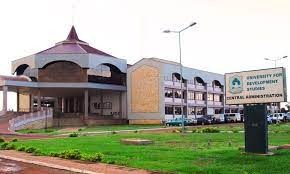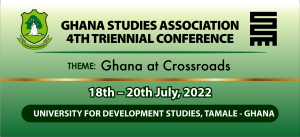Funding Request for GSA Conference
 University for Development Studies, Tamale
University for Development Studies, Tamale
18-20 July 2022
Call for Proposals
The 4th Triennial Conference Theme is “Ghana at Crossroads” because 2022 marks Ghana’s 65 years of independence. Ghana is at an inflection point and is thus due for a complete evaluation of its governance, economy, and society. Building on the last GSA Triennial’s exploration of “Ghana as Center,” the 2022 conference asks participants to consider Ghana as and at a crossroads—in geographies; in networks of people and ideas; in disciplines and knowledge systems; and between past, present, and future. Thinking of crossroads asks us to move from territorially defined understandings to those that are characterized by networks and flows. Participants might envision crossroads as meeting places, exchanges, points of inflection, or nodes in multi-scalar networks. Alternatively, scholars might take the opportunity to propose new paths and reflect on roads not taken.
It is fitting that this conference takes place in Tamale, Northern Ghana, a historical crossroads of intellectual, economic, political, and religious exchange. As generations of scholars have shown, actors in the region have harnessed the power of movement and networks–through ritual commerce,[1] migration,[2] infrastructure[3], and intellectual and political connections[4]—and have cultivated indigenous epistemologies through scholarly and popular networks.[5] Scholars have shown how thinking beyond regional divisions and area studies models opens doors to debates about Ghana’s ongoing relationships with global and local processes of racialization[6] and underdevelopment.[7]
Networks can operate in several dimensions simultaneously, often with ambiguous or surprising results. How might conversations at the crossroads of disciplines assess Ghana’s heritage and envision the country’s future? How would scholars and practitioners reflect on the intersection of material culture, performing arts, and popular culture? How might multi-scalar and long-term perspectives address climate change and envision alternate “livelihood terrains”?[8] How might political centralization and the establishment of new regions shape social, political, and economic networks? What new perspectives on enslavement emerge at the crossroads of narratives from different regions?
While we encourage proposals that engage with these themes, we welcome proposals on other themes or topics. Papers may be in any discipline or area of study, and may be submitted by established scholars, early career faculty and graduate students. We particularly encourage proposals based on fieldwork in northern Ghana and by scholars from and based in northern Ghana.
Subthemes
- Ghana as/at a Crossroads
- Ghana’s Extractive Sectors, Habitat Destruction and Health
- Education, Training and Employment
- Climate Change, Agrarian Change and Green Energy/Technology
- Knowledge Systems and Knowledge Production
- Religious Practice, Past and Present
- Sensing and Centering Race
- Legislating Gender and Sexuality
- Spaces and Networks of Activism
- Popular Culture, Performing Arts and Social Media
- Migration, Borders and Mobility
- Elections, Politics and Leading Ghana at the Crossroads
- Histories and Memories of Enslavement
- Archaeology and Material Culture
- Disability, Pedagogy and the Right to Education
- Health and Healing
- COVID-19, Vaccinations and the Urban-Rural and North-South Divide
- Special Topics
Proposals can be in the form of:
- individual papers
- panels
- roundtables
- special sessions and workshops for emerging scholars
- documentaries, films and presentations that are visual- and performance-based or that make use of digital media
Submission Details and Timelines:
To Propose an Individual Paper:
Send an abstract of 200 words or less and a short bio (no more than four sentences). Be sure to include a paper title at the top of the page.
To Propose a Panel, Roundtable, or Other Session:
Send a short description of the panel topic or session, paper abstracts and titles, and a short bio (no more than four sentences) for each panelist.
Send proposals to: gsa2022Tamale@gmail.com with the subject line “Tamale 2022”, no later than 31 January, 2022. A notice on the status of all proposals will be sent in February 2022.
Registration fees:
GSA members based in the US, Europe, and Asia: $100 (Students: $30)
GSA members based in Ghana: $50 (Students: $20)
Non-members in the US, Europe, and Asia $120 (students – $40)
Non-members in Ghana: $100 (Students $50)
Day pass: $30 (students – $10)
Questions? Email: gsa2022Tamale@gmail.com
[1] Jean Allman and John Parker, Tongnaab: The History of a West African God (Bloomington: Indiana University Press, 2005); Guilia Casentini, “Different Ideas of Borders and Border Construction in Northern Ghana: Historical and Anthropological Perspectives,” Ghana Studies 17 (2014): 177-202.
[2] Joseph Kweku Assan and Dinar D. Kharisma, “Political Economy of Internal Migration and Labor-Seeking Behavior of Poor Youth in Ghana,” Ghana Studies 22 (2019): 3-35.
[3] Jennifer Hart, Ghana on the Go: African Mobility in the Age of Motor Transportation (Bloomington: Indiana University Press, 2016).
[4] A dynamic captured perhaps most clearly by the career of Vice President Mahamudu Bawumia. See also, Jean Allman, “Nuclear Imperialism and the Pan-African Struggle for Peace and Freedom: Ghana, 1959-1962,” Souls 10, no. 2 (2008): 83-102; Benjamin Talton, Politics of Social Change in Ghana: The Konkomba Struggle for Political Equality (New York: Palgrave Macmillan, 2010).
[5] Wunpini Fatima Mohammed, “Journalistic griots: The marginalization of indigenous language news and oral epistemologies in Ghana,” Radio Journal: International Studies in Broadcast and Audio Media 17, no. 2 (2019), 235-52; Anatoli Ignatov, “Agurumyela’s art of connection: Christopher Azaare’s project of curating Gurensi history and culture,” Africa 90 no. 4, 649-666.
[6] Jemima Pierre, “The Racial Vernaculars of Development: A View from West Africa,” American Anthropologist 122, no. 1 (2020), 86-98.
[7] Kwadwo Konadu-Agyemang, “The Best of Times and the Worst of Times: Structural Adjustment Programs and Uneven Development in Africa: The Case of Ghana,” The Professional Geographer 52, no. 3 (2000), 469-483; Jacob Songsore, Regional Development in Ghana: The Theory and the Reality (Accra: Woeli Publishing Services, 2003).
[8] Joseph Awetori Yaro, “Rural Livelihoods at a Cross-Road in Northern Ghana,” 84, in Joseph Awetori Yaro, ed. Rural Development in Northern Ghana (New York: Nova, 2013).

